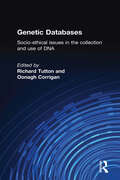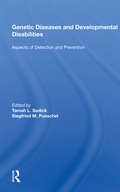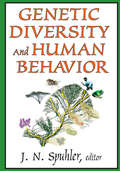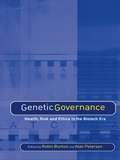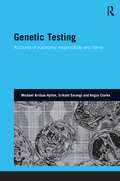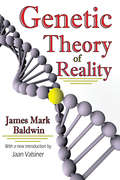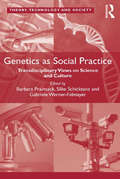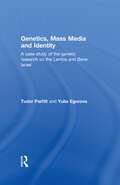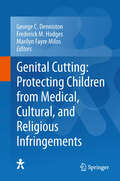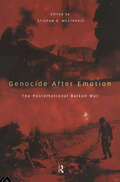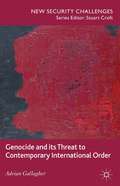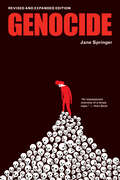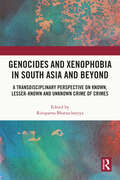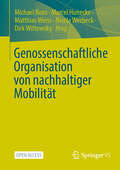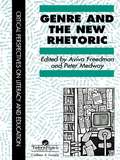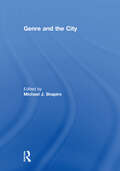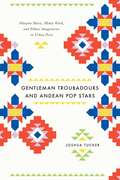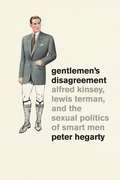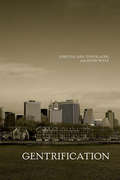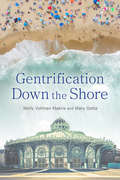- Table View
- List View
Genetic Databases: Socio-Ethical Issues in the Collection and Use of DNA
by Richard Tutton Oonagh CorriganGenetic Databases offers a timely analysis of the underlying tensions, contradictions and limitations of the current regulatory frameworks for, and policy debates about, genetic databases. Drawing on original empirical research and theoretical debates in the fields of sociology, anthropology and legal studies, the contributors to this book challenge the prevailing orthodoxy of informed consent and explore the relationship between personal privacy and the public good. They also consider the multiple meanings attached to human tissue and the role of public consultations and commercial involvement in the creation and use of genetic databases. The authors argue that policy and regulatory frameworks produce a representation of participation that is often at odds with the experiences and understandings of those taking part. The findings present a serious challenge for public policy to provide mechanisms to safeguard the welfare of individuals participating in genetic databases.
Genetic Diseases And Development Disabilities: Aspects Of Detection And Prevention
by Tamah L SadickAdvances in medical genetics during the past two decades have made possible the detection and prevention of many genetic disorders and developmental disabilities. The emphasis of this book is on the application of these new developments to real-life situations. Covering homozygote newborn screening, heterozygote detection in the community, and pren
Genetic Diversity and Human Behavior
by J.N. SpuhlerGenetic differences in humans, like those between individuals of any animal or plant species and those between species, are all products of the evolutionary development of the living world. These differences, with their behavioral consequences, can only be understood in the light of evolution. Our understanding of evolution, however, has itself evolved. The Darwin- Wallace theory of evolution appeared in the nineteenth century. Since then, development of evolutionary thought has gone through several stages. The contributions in this volume describe those stages.
Genetic Governance: Health, Risk and Ethics in a Biotech Era
by Alan Petersen Robin BuntonEthical and practical issues around genetic research are of major international concern, both in academia and in the public domain. Questions concerning what interventions are possible and appropriate with the increasing amount of genetic information available, challenge our understandings of ourselves, our health and wellbeing, and the role of medical ethics, public health, surveillance and risk. However there has been little reflection on the socio-political effects of this new genetic knowledge and the changes in practice that are currently impacting on our lives.Containing contributions from key international researchers, this book examines the broader issues of genetic debates and looks at how prediction and risk assessment is being changed in the arenas of health, medicine and reproduction, bringing new insight on the dangers of surveillance, regulation and increased inequality. Developed out of the Taylor and Francis journal Critical Public Health, the book considers the implications of developments in genetics for contemporary liberal governance, as well as for the future of healthcare and public health.
Genetic Testing: Accounts of Autonomy, Responsibility and Blame (Genetics and Society)
by Srikant Sarangi Michael Arribas-Ayllon Angus ClarkeAdvances in molecular genetics have led to the increasing availability of genetic testing for a variety of inherited disorders. While this new knowledge presents many obvious health benefits to prospective individuals and their families it also raises complex ethical and moral dilemmas for families as well as genetic professionals. This book explores the ways in which genetic testing generates not only probabilities of potential futures, but also enjoys new forms of social, individual and professional responsibility. Concerns about confidentiality and informed consent involving children, the assessment of competence and maturity, the ability to engage in shared decision-making through acts of disclosure and choice, are just some of the issues that are examined in detail.
Genetic Theory of Reality: Being The Outcome Of Genetic Logic - Scholar's Choice Edition
by Jaan Valsiner James Mark BaldwinJames Mark Baldwin left a legacy that has yet to be fully examined, one with profound implications for science and the humanities. In some sense it paralleled that of his friend Charles Sanders Peirce, whose semiotics became understood only a century later. Baldwin was trying to make sense of complex biological and social processes that only now have come into the limelight as biological sciences have re-emerged in psychology. Baldwin's focus on development, based on the observation of his own children and extrapolated to his general theoretical scheme, is fully in line with where contemporary biological sciences are heading. This is exemplified by the bounded flexibility of the work of the genetic system. The general principle of persistent exploration of the environment with the result of creating novelty, which was the core of Baldwin's theoretical system, has since the 1960s become the guiding idea in genetics. Contemporary developmental science is rooted in Baldwin's thinking. In his new introduction, Jaan Valsiner shows that Baldwin's Genetic Theory of Reality demonstrates how human beings are in their nature social beings, establishes an alternative conceptualization of evolutionary theory, and formulates a system of developmental logic, all of which serve as the foundation for developmental psychology as a whole. This is a work of social science rediscovery long overdue.
Genetics and Society: A Sociology of Disease
by Anne KerrGenetic science has advanced rapidly in recent years; things happen now that might have seemed like science fiction only ten years ago. Genetics and Society looks at the history of this science and the wide-ranging impact it has had on contemporary society. Using fascinating and cutting-edge examples throughout, Anne Kerr examines topics as diverse as: the institutional structures that have grown up around the diagnosis and treatment of genetic disorders the media representation of genetic debates from designer babies to the genetic sources of alcoholism the politics of genetic decision-making and the state regulation of both genetic research and the biomedicine industry. Each chapter begins with a summary and a definition of key terms and ends with annotated notes on further reading, meaning that it is as accessible for the layman as it is for the scientist. The resulting student-friendly text will be essential reading for anybody with an interest in genetic science and the impact it is having on society.
Genetics as Social Practice: Transdisciplinary Views on Science and Culture (Theory, Technology And Society Ser.)
by Barbara Prainsack Silke Schicktanz Gabriele Werner-FelmayerRecent debate about the ethical and regulatory dimensions of developments in genetics has sidelined societal and cultural aspects, which arguably are indispensable for a nuanced understanding of the complexities of the topic. Regulatory and ethical debates benefit from taking seriously this ’third dimension’ of culture, which often determines the configurations and limits of the space within which scientific, ethical and legal debate can take place. To fill this gap, this volume brings together contributions exploring the mutual relationships between genetics, markets, societies and identities in genetics and genomics. It draws upon the recent transdisciplinary debate on how socio-cultural factors influence understandings of ’genetics2.0' and shows how individual and collective identities are challenged or reinforced by cultural meanings and practices of genetics. This book will become a standard reference for everyone seeking to make sense of the controversies and shifts in the field of genetics in the second decade of the twenty-first century.
Genetics, Mass Media and Identity: A Case Study of the Genetic Research on the Lemba
by Tudor Parfitt Yulia EgorovaThis is the first book to explore the effect of genetic research on the Lemba Judaising community of Southern Africa and the phenomenon of Israelite identity. The science of genetics as relayed by the media is perceived by laymen as being irreproachably objective 'hard science': its disinterested 'scientific' findings appear immensely impressive and may therefore act as a powerful catalyst for change. In this case, an oral tradition cherished by many of the Lemba that they are of Jewish origin appears to be supported by recent DNA testing, which has deeply affected the narrative and religious identity of the group and the way the tribe is perceived in the Western world. International in appeal, this topical text brings together cutting-edge research on the social, cultural and ethical implications of genetics and the study of Judaising movements across the world. This book will be of interest to researchers and students of Jewish history, genetic anthropology, race and ethnicity studies, and religious and cultural studies.
Geniale Frauen in der Wissenschaft: Versteckte Beiträge, die die Welt verändert haben
by Lars JaegerObwohl Frauen schon früh das wissenschaftliche Denken mitgeprägt haben, sichtbar geworden sind sie fast nie. Dieses Ungleichgewicht setzt sich bis heute fort, auch wenn es aktuell weit mehr Wissenschaftlerinnen gibt als jemals zuvor. Lars Jaeger spannt einen Bogen von der Antike bis heute und porträtiert in essayartigen Einführungen das Leben und Wirken der wohl bedeutendsten weiblichen Naturwissenschaftlerinnen und Mathematikerinnen. Von Hypatia von Alexandria über Émilie du Châtelet und Emmy Noether bis hin zu Lisa Randall, sie alle haben Großes geleistet, die Wissenschaft entscheidend vorangebracht und konnten dennoch oft nicht aus dem Schatten ihrer männlichen Kollegen treten.Neben den spannenden Porträts der einzelnen Wissenschaftlerinnen sowie einer detaillierten und anschaulichen Darstellung ihrer wissenschaftlichen Leistungen beleuchtet dieses Sachbuch auch das Geschlechterverhältnis in der Wissenschaft, das sich nur quälend langsam zugunsten eines fairen Verhältnisses für die Frauen entwickelt.
Geniale Prinzipien der Natur: Rechnen wir mit der Natur oder die Natur rechnet mit uns [ab]
by E. W. KüppersDieser Band legt den Schwerpunkt auf praktische Anwendungen der Prinzipien, die aus der Natur in unserem Gestaltungsraum übertragen werden können. Er ist dabei getragen von den Regelungs- und Steuerungssystemen, wie sie die Wissenschaft der Kybernetik beschreibt.
Genital Cutting: Protecting Children from Medical, Cultural, and Religious Infringements
by Frederick M. Hodges Marilyn Fayre Milos George C. DennistonThis volume contains the proceedings of the 10th International Symposium on Circumcision, Genital Integrity, and Human Rights. Authors are international experts in their fields, and the book contains the most up-to-date information on the issue of genital cutting of infants and children from medical, legal, bioethical, and human rights perspectives.
Genocide after Emotion: The Post-Emotional Balkan War
by Stjepan G. MeštrovićThe failure to adequately respond on the part of the major Western superpowers to the atrocities in the Balkans constitutes a major moral and political scandal. In Genocide after Emotion Mestrovic and the contributors thoroughly interrogate the war, its media coverage and response in the West. The result is alarming, both for the progress of the war and for the condition of our society today: the authors argue that the West is suffering from a "postemotional" condition - we are beyond caring about anything anymore.
Genocide and Mass Violence
by Devon E. Hinton Alexander L. HintonWhat are the legacies of genocide and mass violence for individuals and the social worlds in which they live, and what are the local processes of recovery? Genocide and Mass Violence aims to examine, from a cross-cultural perspective, the effects of mass trauma on multiple levels of a group or society and the recovery processes and sources of resilience. How do particular individuals recall the trauma? How do ongoing reconciliation processes and collective representations of the trauma impact the group? How does the trauma persist in 'symptoms'? How are the effects of trauma transmitted across generations in memories, rituals, symptoms, and interpersonal processes? What are local healing resources that aid recovery? To address these issues, this book brings into conversation psychological and medical anthropologists, psychiatrists, psychologists and historians. The theoretical implications of the chapters are examined in detail using several analytic frameworks.
Genocide and its Threat to Contemporary International Order: Consent And The Controlled Body (New Security Challenges)
by A. GallagherFor far too long the discipline of International Relations has failed to engage with the study of genocide. This is despite the fact that genocide holds a direct relationship with the central concepts of international relations: the state, war, power, and security. This bold, innovative and unique book sets out to tackle this by bringing the concept of genocide into the discipline of IR, via the English School, in order to theorise the relationship between genocide, justice, and order. Drawing on a wide-range of primary and secondary interdisciplinary material from International Relations, Genocide Studies, Security Studies, International Law, History, Politics and Political Theory, this book aims to understand genocide within the context of International Relations and the implications that this has on policymaking. Gallagher identifies the obstacles and challenges involved in bringing the study of genocide into IR and uniquely analyses the impact of genocide on the ordering structure of international society.
Genocide: Key Themes
by A. Dirk Moses Donald BloxhamThe growth of scholarship on the pressing problem of genocide shows no sign of abating. This volume takes stock of Genocide Studies in all its multi-disciplinary diversity by adopting a thematic rather than case-study approach. Each chapter is by an expert in the field and comprises an up-to-date survey of emerging and established areas of enquiry while highlighting problems and making suggestions about avenues for future research. Each essay also has a select bibliography to facilitate further reading. <p><p>Key themes include imperial violence and military contexts for genocide, predicting, preventing, and prosecuting genocide, gender, ideology, the state, memory, transitional justice, and ecocide. The volume also scrutinizes the concept of genocide - its elasticity, limits, and problems. It does not provide a definition of genocide but rather encourages the reader to think critically about genocide as a conceptual and legal category concerned with identity-based violence against civilians.
Genocide: Revised and Expanded Edition (Groundwork Guides)
by Jane SpringerWhat is genocide? Why does it happen? What can be done to prevent it from happening again? At the end of the Second World War, with the establishment of the United Nations, the holding of the Nuremberg Trials and the adoption of the Genocide Convention, the international community assured itself that genocide would never happen again. But never again has become a meaningless phrase. This book asks why. It also asks, what is genocide? Where has it happened in the past? Who is being threatened by genocide today? And what can we do to prevent this terrible crime from recurring? Providing an overview of the history of genocide worldwide, this revised, expanded edition helps readers answer these questions. It brings them up to date with recent events—the killing of the Rohingya in Myanmar, the persecution of the Uyghurs in China, the broader recognition of the genocide of Indigenous Peoples, the resurgence of fighting in Darfur, and the wars in Ukraine and the Middle East. It examines and elucidates the debates and controversies surrounding the use of the term genocide as well as the reasons for the common response by individuals, governments and the United Nations — denial. Key Text Features annotated resources chapters definitions explanation facts further information further reading headings historical context illustrations index map sidebars table of contents timeline
Genocides and Xenophobia in South Asia and Beyond: A Transdisciplinary Perspective on Known, Lesser-known and Unknown Crime of Crimes
by Rituparna BhattacharyyaThis volume foregrounds some of the unknown or lesser-known incidents of xenophobia and genocide from India, Bangladesh, Sri Lanka, South Africa, and Rwanda. It critically analyses the cultural and structural contexts triggering these various forms of genocides and xenophobia, and situates them within modern histories of violence and human tribulations. The book discusses various non-western case studies which include the communal violence incited by anti-CAA protests in Delhi; the expulsion and displacement of Kashmiri Pandits; xenophobic attitudes against illegal immigrants in Assam; genocide in Sylhet during the Liberation War of Bangladesh; the 1994 genocide in Rwanda; and incidences of human rights violations across the world. A comprehensive and transdisciplinary text, the book will be useful for students and researchers of human geography, sociology, political science, social work, anthropology, colonialism and postcolonialism, nationalism, imperialism, human rights, and history.
Genossenschaftliche Organisation von nachhaltiger Mobilität
by Marcel Hunecke Michael Roos Matthias Weiss Nicola Werbeck Dirk WittowskyGenossenschaftliche Organisation von Mobilität ist eine soziale Innovation und ein vielversprechender Ansatz für eine effiziente Mobilität der Zukunft. Genossenschaften spielen in der Nachhaltigkeitstransformation eine wichtige Rolle. Das Open Access Buch ist die erste umfassende Aufarbeitung für Mobilitätsgenossenschaften und stellt die Frage nach deren Potenzialen, Chancen und Herausforderungen. Die Beiträge beleuchten aus interdisziplinärer Perspektive verschiedene Aspekte (Organisations- und Geschäftsmodelle, Zahlungsbereitschaften, verkehrs- und raumwissenschaftliche Aspekte, psychologische Einflussfaktoren), beschreiben durchgeführte Realexperimente und werten deren Erkenntnisse aus. Ein Leitfaden bietet zudem eine Hilfestellung für die Gründung und den Betrieb einer Mobilitätsgenossenschaft. Der Band enthält Beiträge aus dem Forschungsprojekt „GenoMobil – Genossenschaften als Organisationsform für eine sozial-ökologische Transformation integrierter Mobilität&“. Seine Zielgruppe sind Mobilitätswissenschaftler:innen sowie Privatpersonen und Institutionen auf der Suche nach geeigneten Organisationsformen gemeinschaftlicher Mobilität.
Genre In The New Rhetoric (Critical Perspectives On Literacy And Education Ser.)
by Peter Medway Aviva FreedmanSince The Mid-1980s The Notion Of "Genre" Has Been Dramatically Redefined. This redefinition has prompted theorists and scholars alike to analyze the shaping power of language and culture, and the interplay between the individual and the social.; Recent work in genre studies has drawn upon ideas and developments from a wide range of intellectual disciplines including 20th-century rhetoric, literary theory, sociology and philosophy of science, critical discourse analysis, education and cultural studies. In this text, leading theorists reflect and capitalize on the growing interest in genre studies across these allied fields, and examine the powerful implications this reconception of genre has on both research and teaching.
Genre and the City: Politics, Philosophy And Genre (Interventions Ser.)
by Michael J. ShapiroThis book’s chapters analyze aspects of urban politics with a combination of critical thinking (influenced by Walter Benjamin, Jacques Ranciere, Henri Lefebvre, and Achille Mbembe, among others) and readings of artistic genres (film, literature, and architecture). The coverage of cities includes, Tokyo, Paris, New York, Nairobi, Boston, Berlin and Hong Kong.
Gentleman Troubadours and Andean Pop Stars: Huayno Music, Media Work, and Ethnic Imaginaries in Urban Peru
by Joshua TuckerExploring Peru's lively music industry and the studio producers, radio DJs, and program directors that drive it, Gentleman Troubadours and Andean Pop Stars is a fascinating account of the deliberate development of artistic taste. Focusing on popular huayno music and the ways it has been promoted to Peru's emerging middle class, Joshua Tucker tells a complex story of identity making and the marketing forces entangled with it, providing crucial insights into the dynamics among art, class, and ethnicity that reach far beyond the Andes. Tucker focuses on the music of Ayacucho, Peru, examining how media workers and intellectuals there transformed the city's huayno music into the country's most popular style. By marketing contemporary huayno against its traditional counterpart, these agents, Tucker argues, have paradoxically reinforced ethnic hierarchies at the same time that they have challenged them. Navigating between a burgeoning Andean bourgeoisie and a music industry eager to sell them symbols of newfound sophistication, Gentleman Troubadours and Andean Pop Stars is a deep account of the real people behind cultural change.
Gentlemen's Disagreement: Alfred Kinsey, Lewis Terman, and the Sexual Politics of Smart Men
by Peter HegartyWhat is the relationship between intelligence and sex? In recent decades, studies of the controversial histories of both intelligence testing and of human sexuality in the United States have been increasingly common--and hotly debated. But rarely have the intersections of these histories been examined. In Gentlemen's Disagreement, Peter Hegarty enters this historical debate by recalling the debate between Lewis Terman--the intellect who championed the testing of intelligence-- and pioneering sex researcher Alfred Kinsey, and shows how intelligence and sexuality have interacted in American psychology. Through a fluent discussion of intellectually gifted onanists, unhappily married men, queer geniuses, lonely frontiersmen, religious ascetics, and the two scholars themselves, Hegarty traces the origins of Terman's complaints about Kinsey's work to show how the intelligence testing movement was much more concerned with sexuality than we might remember. And, drawing on Foucault, Hegarty reconciles these legendary figures by showing how intelligence and sexuality in early American psychology and sexology were intertwined then and remain so to this day.
Gentrification
by Loretta Lees Tom Slater Elvin WylyThis first textbook on the topic of gentrification is written for upper-level undergraduates in geography, sociology, and planning. The gentrification of urban areas has accelerated across the globe to become a central engine of urban development, and it is a topic that has attracted a great deal of interest in both academia and the popular press. Gentrification presents major theoretical ideas and concepts with case studies, and summaries of the ideas in the book as well as offering ideas for future research.
Gentrification Down the Shore
by Mary Gatta Molly Vollman MakrisGentrification in cities in the United States is a hot topic, but this book contributes something new to the ongoing discussion by offering a rich case study of seasonal gentrification and its effects on long time residents. Asbury Park, New Jersey, an iconic beachfront city, was a dynamic resort community in the late 19th and early 20th century. As the century wore on Asbury Park became an illustration of some of the macro social and economic structural changes occurring in cities across the United States with its own beachfront twist. Yet in 2019 Asbury Park’s narrative has shifted again—named among the coolest small towns in America the city has multimillion-dollar beachfront condos attracting the attention of Hollywood stars and national media attention as a travel destination. Summer days in Asbury once again mean tourists strolling the boardwalk and dining by the Atlantic Ocean. But just across the railroad tracks from the seasonal crowds, many of Asbury’s long-time residents live below poverty and struggle for their share of this prosperity throughout all four seasons of the year. Molly Vollman Makris and Mary Gatta engage in a rich ethnographic investigation of Asbury Park to better understand the connection between jobs and seasonal gentrification and the experiences of long time residents in this beach-community city. They demonstrate how the racial inequality in the founding of Asbury Park is reverberating a century later. This book tells an important and nuanced tale of gentrification using an intersectional lens to examine the history of race relations, the too often overlooked history of the post-industrial city, the role of the LGBTQ population, barriers to employment and access to amenities, and the role of developers as the city rapidly changes. Makris and Gatta draw on in-depth interviews, focus groups, ethnographic observation as well as data analysis to tell the reader a story of life on the West Side of Asbury Park as the East Side prospers and to point to a potential path forward.
